#Racism in Professions
Explore tagged Tumblr posts
Text
oh yea i never did post that therion/temenos analysis bc it refused to get under 2k words but the crux of it was that therion is a very passive character to the point that not killing people is about the only choice he personally makes(even in their final argument, darius is the one who starts it and therion is just defending himself for the majority of it), otherwise he's always following someone else's orders, whether it be heathcote or barham and he fucking hates his job. temenos on the other hand is an intj empath with a savior complex who is extremely active, refuses to listen to anyone he doesn't respect which is all but one person who dies before the first chapter is over, and his job is his life's calling.
#c.paradisi#octoposting#theres more. my god is there more#imo the most illustrative comparison is therion's relationship with tressa#in contrast to temenos' relationship with ochette#as the two of them are both infantilized in similar ways although ochette does get it leagues worse#in his chapter 2 he interacts with her the way he does when he compares professions with anyone#like this does require you to understand that tressa and therion are Doing A Bit in his ch3/ch4#theyre doing a comedy skit where he owns her epic-style and shes like YOURE SO MEAN TO ME 🥺🥺🥺🥺🥺#her banters in her own story with him make it clear she was never actually scared of him#and Doing A Bit is one of her skills. she uses it to cheer up him and alfyn in their ch4s.#therion is a jester. a jokester. he likes bickering but not arguing and will back down if youre actually mad at him#thats why he immediately stops in her earlier banters when she tells him to shut the fuck up and means it#hes calling her a brat to give her a setup to go Now Listen Here Buddy#as opposed to temenos who does not see ochette as a person. she is not sentient to him#their entire dynamic is him treating her like an actual toddler#god forgive me im about to sound like the ot wiki but his relationship with ochette#is most similar to primroses' with tressa. who also treats her like a literal toddler#altho in primroses case the problem is misogyny(tressa is 18. have you ever met an 18 year old who didnt know what sex was.)#while temenos' is racism(doesnayone else remember hte fucking human language one)
2 notes
·
View notes
Text
"genocidal apartheid ethnostate" oooh the antisemites have trained you well to regurgitate words you don't know the meaning of.
1. This can't be a genocide if the Palestinian population is increasing. Which it is. Also, if the IDF actually wanted to genocide the Palestinians they would have done it already. On top of that, there has been absolutely ZERO attempt at cultural or historical erasure of Arab populations in the Levant.
2. Cannot be apartheid as while I'm sure racism exists in Israel, everyone has the same rights. Having a border is not apartheid. Especially if the people complaining about apartheid are mad you even exist. This is a meaningless use of the word, especially as Palestinians live alongside Israelis in Israel and are overrepresented in the medical profession.
3. "ethnostate" = "how dare a country have a Jewish majority???" Almost every state in the world is an "ethnostate" by this definition. America is 80% white but nobody questions that. Of the Israeli population, 30% are not Jewish. Russia is guess what? majority Russian! but what do you hear about it? Radio silence. I don't hear you complaining about European ethnostates responsible for mass colonization and *actual* genocide, who actually tried to expunge other ethnicities (see Spain, 1500s, which is what invented the ghetto system first used on Jews and then on Black people in America) but maybe that would make your white savior selves too uncomfortable uwu. You know, I think actually treating minorities as independent people and not infantilized props for you to make yourself feel good and to assuage white guilt is almost impossible for you.
CRITICIZE NETANYAHU, SUPPORT ANTI FASCIST PROTESTS IN ISRAEL, SUPPORT THE PALESTINIAN YOUTH MOVEMENT CALLED WE WANT TO LIVE, TRY AND SEE THAT NOBODY CARES ABOUT YOU INSERTING YOURSELF TO MAKE YOUR POOR WIDDLE WHITE FEELINGS BETTER. YOU HAVE MADE JEWS THE EVIL WHITE PEOPLE SO YOU DON'T HAVE TO FIX YOUR MISTAKES AND INSTEAD CAN ATTACK US.
693 notes
·
View notes
Text
Agatha All Along, the highly anticipated follow-up to WandaVision, begins airing this week on Disney+. Now is the perfect to revisit some important information about both shows and the context in which some of Agatha's new characters are being introduced.
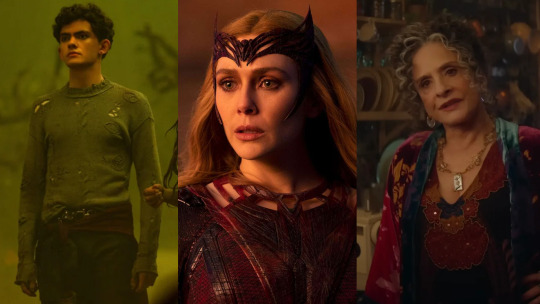
WandaVision primarily followed the character Wanda Maximoff and expanded on her family history by introducing her late parents as well her twin sons, who are born from magic and age rapidly over the course of the series.
In the Marvel comics source material, Wanda is part of a large, multigenerational family of Jewish and Romani characters whose stories frequently reflect the systemic violence and oppression that both communities face-- including Romani Holocaust victims, who are critically underrepresented in both education and media. In the MCU, these identities and histories are completely erased, and the characters are all played by white actors. Alternate versions of these characters also appear in the Fox X-Men films, and are similarly whitewashed.
The Romani people are a racialized minority that originated as a South Asian diaspora, and who face severe systemic oppression in Europe and North America. The modern Romani population is quite diverse, but they are not of white ethnic origin, and despite the fact that Wanda and her family have historically been drawn with white features, they are minority characters and ought to be considered as such.
Depictions of witches and witchcraft are often entwined with antisemitism and anti-Romani racism. In pop culture, witches and fortunetellers are typically portrayed as visual stereotypes of Romani women. In the real world, fortunetelling is a profession born from survival work, one which Romani families are often heavily policed and racially profiled for practicing. While Wanda usually subverts these tropes, they are often played straight elsewhere in the superhero genre, and any story about witches, especially one featuring Romani characters, needs to be critiqued in this context.
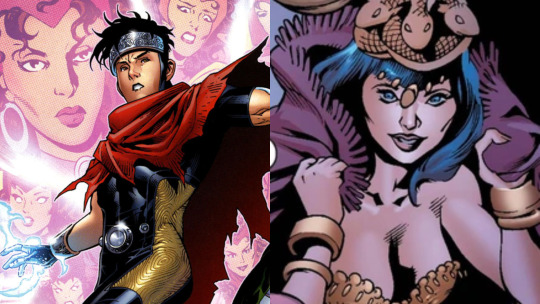
Agatha All Along introduces viewers to a new cast of characters, including Lilia Calderu, played by Patti LuPone, and the enigmatic "Teen", played by Joe Locke, who is heavily speculated to be an incarnation of Wanda's son, Billy.
In the comics, Lilia is a member of a prominent Romani family in Wanda's community. Often lauded as the "witch queen of the gypsies," Lilia embodies many racial stereotypes about Romani women. In Agatha All Along, Lilia is depicted as an older Sicilian woman, however, being portrayed as a batty fortuneteller with a tawdry psychic shop, she still embodies an offensive trope. Although Lilia is far from "good" representation, this is not an improvement-- if anything, it's even more exploitative.
Billy was raised in a Jewish American household and places a very strong emphasis on his Jewish identity, in addition to having Romani heritage. His identity as a young gay man is always presented in conjunction with this heritage, not in spite of it. Though there is a significance to Locke being a gay actor playing a gay character, his casting-- if he is indeed playing Billy-- is not authentic. White gay representation should not supersede racial inclusivity, and it is not an excuse for whitewashing or Jewish erasure.
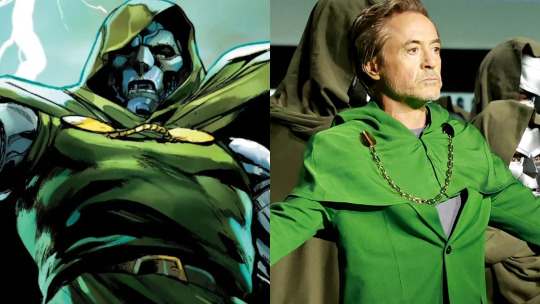
Marvel Studios recently announced that the character Doctor Doom will be played by Robert Downey Jr., who is returning to the franchise after many years in the role of Iron Man. In the source material, Doom is also a Romani character with a very similar background to Wanda's. This identity is central to Doom's character-- although he is written to be both morally and politically challenging, the liberation of his people has always been a primary motive.
Clearly, this type of whitewashing is an ongoing pattern in the MCU franchise. Although "Teen's" identity is still unconfirmed and Lilia may, ultimately, be of little consequence, they are part of a larger problem, and Agatha All Along needs to critiqued in that context.
#agatha all along#billy kaplan#wiccan#joe locke#patti lupone#lilia calderu#wanda maximoff#scarlet witch#doctor doom#victor von doom#robert downey jr
759 notes
·
View notes
Note
The rise of acceptable anti-blackness is everywhere, and leftists have insidious way of positioning black bodies and black communities as regressive, monsterous, and in need of guidance. I'm finding it works the exact same way as the neo-nazi pipeline. They ask "genuine questions," that ultimately serve to gather an audience, shift through the ramble for supporters, and fan the flames of fascism. All their questions already have a (bigoted) answer. It's a recruitment strategy:
"Why are black southerners homophobic, but vote Democrat?"
"Why is rap music so sexist?"
"Shouldn't black people know better than to be sexist/transphobic/homophobic?"
These are actual questions I've seen. I'm stumped at what to do about it.
It comes, unfortunately, with being a hypervisible marginalization.
Black people are not allowed to just be. We are required to do so much more than just exist in order to get basic respect and acknowledgement as fellow human beings.
My new manager (a black man) and I were just joking about this- he was complaining that my clinic which is now majority white due to some serious workplace drama (previously was majority Puerto Rican) had some very drying soaps and chemicals we clean with but an ancient mostly empty bottle of hand lotion and how he'd have to fix that. I made a joke about being ashy and we had a giggle about making sure to moisturize the hands, knees, ankles, and elbows especially in a customer-facing job where you are expected to look presentable, clean, professional, well-groomed, always wearing crisp and freshly laundered clothes, and of course your best customer service smile and polite language.
And it's not to say that that isn't true of everyone who works there- but I do find it interesting that one of the white women who work there can show up with frizzy hair and be fighting with the humidity all day and be fine, but I have been Spoken To in this profession for my hair looking "sloppy" and "dirty" while wearing it in a natural style, freshly done up and with products in it. Not at this specific job, but within this career.
Our margin for error is much narrower than others- and our ability to be seen as individuals instead of as a hive mind is even less. Every single person asked me about the Kendrick Superbowl thing- I don't watch football and I don't listen to Kendrick as a general rule (if I'm listening to rap 99% of the time I'm listening to black women and not men because often I like their sound and lyrics better) so it took me several days to even watch the thing. But every white person out there made sure to ask me how I felt about it.
I'm always willing to discuss the Problems in the black community in an open and honest light, but I find I'm less willing to discuss them if I don't feel like the question is coming from a place of wanting to understand and more like the question is coming from a place of ignorance and/or racism. I talk about these things with my white friends sometimes- my white friends who have never given me weird vibes about race and who often are of marginalized experience themselves (and sometimes highly visible marginalized experience such as my Jewish friends and my trans fem friends!) - but a random ask I am less inclined as I do not think that person is actually wanting to understand the answer to such a short question with such a nuanced and complicated reason.
189 notes
·
View notes
Text
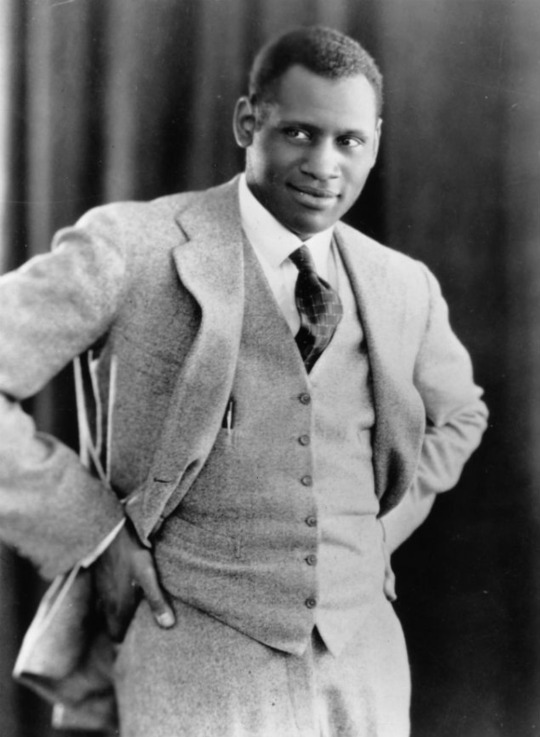
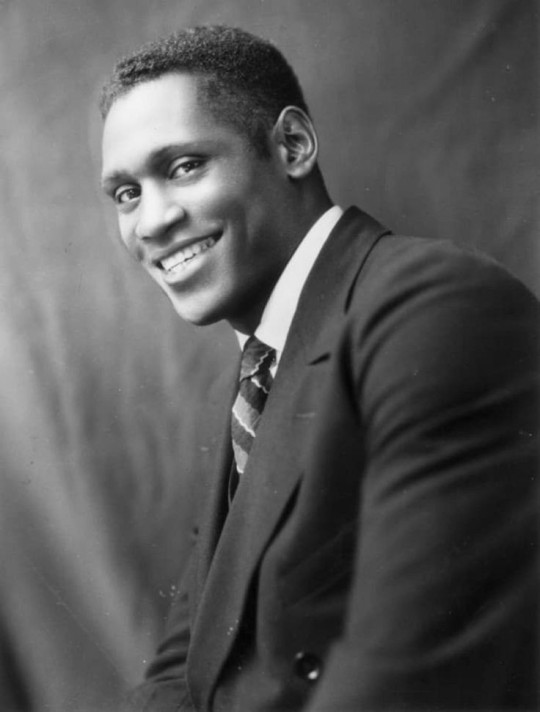
Paul Robeson (1898–1976) was an American singer, actor, athlete, and activist who became a prominent figure in the 20th century for his artistry and commitment to social justice. Born in Princeton, New Jersey, Robeson excelled academically and athletically, earning a scholarship to Rutgers University, where he was a standout football player and valedictorian of his class. He later earned a law degree from Columbia University but left the legal profession due to racial discrimination.
Robeson gained international fame for his deep bass-baritone voice and powerful stage presence. He is best remembered for his performances in productions such as Show Boat (notably singing "Ol' Man River") and Othello, which he portrayed on stage in both the U.S. and the U.K. He also had a successful recording and film career.
Robeson was a vocal advocate for civil rights, labour rights, and anti-colonial movements. He criticized racism in the U.S., supported the labour movement, and opposed fascism. His outspoken support for socialism and his association with the Soviet Union during the Cold War led to his blacklisting in the U.S., a significant decline in his career, and heavy government surveillance.
In his later years, Robeson's health declined due to a combination of medical issues and the stress of political persecution. He retired from public life in the mid-1960s and lived out his final years in Philadelphia.
Paul Robeson died on January 23, 1976, at the age of 77, from complications of a stroke. He left behind a legacy as a trailblazing artist and a fearless advocate for equality and human rights.
#black people#black history#black#blacktumblr#black tumblr#pan africanism#black conscious#africa#black power#black empowering#paul robeson#biography#black revolutionaries
339 notes
·
View notes
Note
hey what racism or speciesm do puppets face. And does wally still get harrased for being a puppet
Second question first
Very rarely do they have bad experiences, Wally coordinates their activities to avoid unwanted interactions. There are still people who disregard puppets no matter the circumstances, so harassment is expected sometimes.
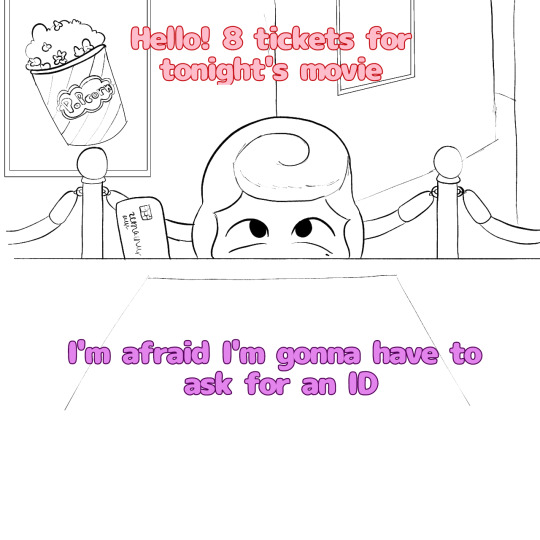
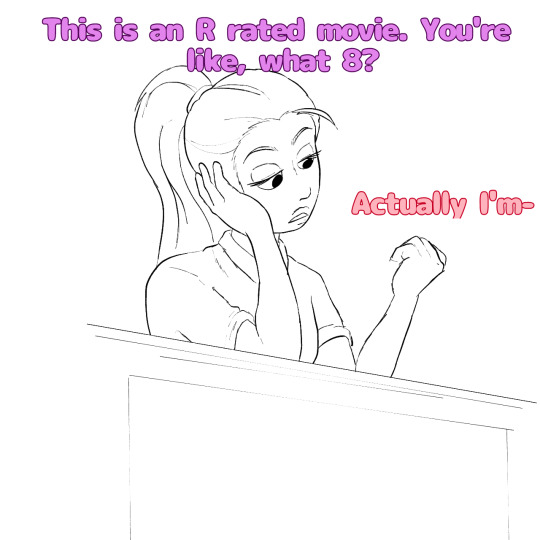
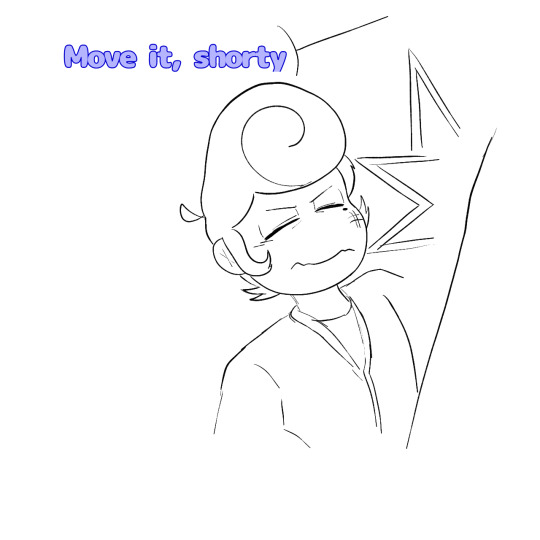
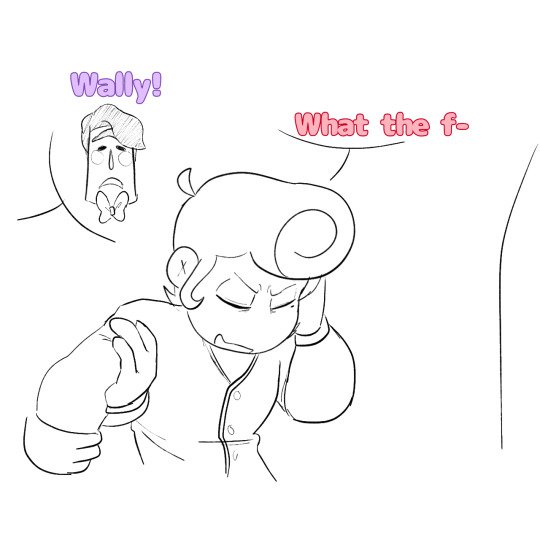
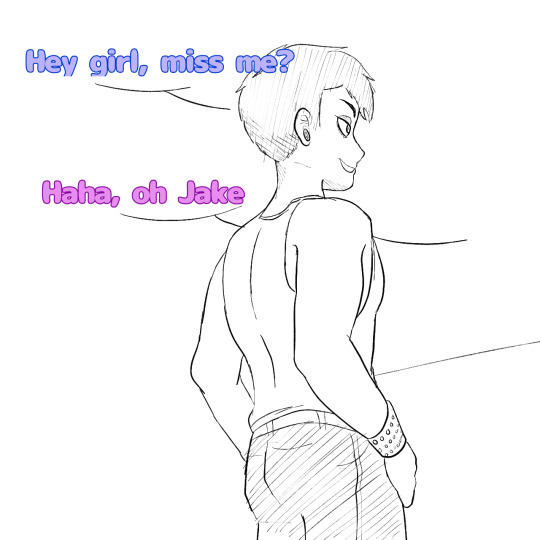

He forgets he has no power out of the studio. Wow some people are something. Luck for Wally, his friends seem to think it’s not anything against them being puppets.

So types of intolerance puppets receive would be almost passive aggressive than anything
They get paid noticeably less than human men and women. Puppets are encouraged to stay in small entertainment, and are pushed from other professions. Though there’s been a good number of puppets who managed to get good paying jobs, but not all. Any police reports made by them are not taken seriously and usually get thrown out. Some establishments take advantage of this to change their rules and prices.
Don’t get me wrong, the majority shows at least human decency and means no ill will.
Should note racism against poc still exists as it is now and laws for puppet equality have not been established yet. Progress is happening, just can’t see it often.
2K notes
·
View notes
Note
Why do you dislike a lot of the Nord stuff?
argggg okay fine i will talk about it again. bc i am absolutely certain i have discussed it before
for starters, i am from a family that is at least partially norwegian. i have a norwegian prayer in the kitchen from my great-great grandmother who visited and brought it back. i worship norse gods, and because of this read a lot of history papers and academic sources (because a lot of people will just Fucking Lie about this shit) to get a better understanding of my gods and various other spirits and religious systems that would have been in place in antiquity, as well as tracking how these folk stories have evolved.
but the nords. the nords are just terrible pop culture vikings by and large. they barely resemble any actual norse people, but its very clear they are based on that. and there is a lot of Bad implications of it, as well as it just not making any fucking sense.
a lot of the shitty violent pop culture viking bullshit is based heavily on conan the barbarian. which is weird because conan is not norse at all. why he became conflated with viking shit is beyond me, but i am not an expert on pulp fiction novels or bad 80's fantasy movies. perhaps it is because of the connotations of "barbarian" being given to northern europeans by the greeks (and i believe romans). maybe he is conflated with vikings in the novels or movies. idk.
"well why does that even matter? can't people take inspiration from old fantasy stories and give it a new spin?" it is a problem because of a few reasons.
a lot of these mythologized, false tales of "the great white viking warriors of the superior aryan race" were made up by nazis. crafted whole cloth by white supremacists and used to further fuel white supremacy in nazi germany and commit all the violence in the name of white supremacy. thats why old futhark runes were co-opted by them. thats why white supremacists today keep an iron grip on this false belief and aesthetics. you cannot divorce the "fantasy" story from the fact this "fantasy" was originally created in the name of furthering white supremacy.
we get a double dose of racism in that the "barbarian" aesthetic is just a bunch of non white "tribal" clothes and customs and aesthetics all shoved into a blender, pureed, and then poured all over white people. with a heavy dash of violence added on top, because why not conflate all "barbaric" cultures with warmongering and violence. the only reason pop culture "vikings" are exalted for this violence is because they are white. but other cultures get conflated with a hyper specific northern european raiding culture, and then are treated with violence because of it.
also, i find this kind of militant violence to be frankly fucking stupid and makes no god damn sense. vikings were a specific profession that existed in a specific period of time. most norse people were farmers, fucking obviously. but with this conflation of purely war mongering barbarians with nothing else to their culture besides war and violence means you get the majority of their people being people dying in war.
who is growing food? making clothes? crafting weapons? raising animals? spinning thread? doing the wood working on all these boats and houses? these things are the backbones of society, but are treated as an unimportant after thought or given no acknowledgement whatsoever. instead everyone is obsessed with fucking dying in battle it seems.
the esteemed halls of the dead in norse mythos were not the pinnacle of honor people were expected to strive for, but instead stories told to grieving families who couldn't even bury their loved ones properly, as taking a dead body back across the sea in a boat wasn't really feasible. but now those stories have become equated to the goals in life the norse people had the same way christians want to go to heaven. the norse people weren't even a culture that focused on the afterlife all that much! it was more so concerned with living a good life for the sake of having a good life. the afterlife most people went to would just be a continuation of their life on earth. but again, there is one big nord afterlife in TES, based on valhalla, where people strive to go to after death so they can be ready to fight a big battle with shor at the end of time.
the nord lore and pantheon is likewise irritating to me because i keep getting the vibe they are trying to fit the norse pantheon and stories into a very christian framework. kirkbride's work slightly less so but its instead trying to put the norse pantheon in a different framework, one i don't fully know. but when you know most of the moving parts of old norse religion, you begin to see that its quite difficult to rip parts out and shove it into something else and have it all work right.
so basically i think the nords are a confusing amalgamation of pop culture nonsense, christianity, and bullshit that is seeped in real world racism regardless of how much people want to just. not think about it. it annoys me at best and royally pisses me off at worst. even today there are still white supremacists eating skyrim slop up and racist skyrim content used to further radicalize people to white supremacist ideology. this wasnt even intentional on bethesda's part, but that doesn't mean its not painfully obvious.
55 notes
·
View notes
Note
Chris Storer's denial of sydcarmy is frankly bc of racism. I mean their insistence that they aren’t even a possibility just screams oh how could a dark skinned BW be a love interest. And Claire is like a self insert for Chris storer to project his fantasies onto. So the story itself is pointing toward a sydcarmy endgame but I don’t think CS wants that. Do you think they stand a chance?
If Chris genuinely did not want sydcarmy he would not be constantly making scenes of them alluding to them being soulmates. He's doing it on purpose. The panic attack, table scene, hamachi dish, scarf dish etc were not accidents.
He's never had to talk about his projects to the press like this before. Clearly they all were in desperate need of some media training and to all get on the same agenda of what they were going to say about them without sounding completely repulsed by the idea of sydcarmy. Cause in the end it's going to bite them in the ass and have all the same racist reddit misogynists that they fooled into loving Claire up in arms when Carmy doesn't end up with her, and even worse ends up at least acknowledging or professing his love for Syd.
I think he went in very race blind into this show and did not fully think through how dragging that Claire story line only to have sydcarmy at the last minute would be bad optics on him. I don't think Claire is Chris' fantasy, I think he is actually constantly making fun of her and the idea of her. Which is why he has the dumbest characters in his show riding hard for her but also being gross and misogynistic towards her. He's practically married to Gillian, and I definitely do not think she is meant to be a representation of her.
The bulk of the story is about Syd and Carmy's relationship to and with each other. It's going to stay that way and there will be a happy ending for the both of them together. But how they go about that happy ending and chose to actually show them together in the end is really what is going to have people deciding whether or not they've made her into a sort of disposable black girlfriend that only plays out in like the last episode of the show.
40 notes
·
View notes
Text

Fandom Problem #6783:
I used to like an artist, but now she's on Twitter accusing archaeologists of racism because a recent dig found proof her ancestors practiced human sacrifice 1000+ years ago. She insists the dig was faked to make her ethnic group look bad. it's a lost cause to explain everyone's ancestors practiced human sacrifice at some point. I'm trying to separate the art from the artist, but it's damn hard when she's drawing comics shitting on archaeology as a profession and getting dangerously close to anti-intellectualism.
73 notes
·
View notes
Text
God I just saw a video essay about the Bear and the guy who made it even recognized that the clairexcarmy scenes that seem to try to makes us care about the relationship and all the other Claire scenes where so perpetually shallow, that she is still a manic pixie “bunny girl” in his own words, but he suggested that she may need her own episode so the audience can get “to know her mind”…🤢
Like, I know is difficult to tell what exactly is so wrong about her, but is interesting that even the people that straight up don’t care about a ship that is two seasons in the making don’t get to imagine is because that’s the intention of the show. Is like those characters that you may not trust but may not completely dislike either.
But this guy also seemed to think that Syd didn’t have a right to move forward from the Bear so…
My biggest problem is I also understand the people that say Syd doesn’t do much, and I am pretty sure that’s her arc, to let her take the wheel of her own life next season once and for all.
There is a lot of racism and misogyny involved in this discussion, but even the people that are not stupid like that, seem to not suspect of Claire (in part because is the shows intention to misdirect them) but also because what they have seen from Syd is not enough for them to root for her. The same way some people didn’t root for Richie until “Forks”
God I am rambling. There is a discussion to have about what makes people care about characters because I rooted for Richie since the phone call in the trip to the store.
I refuse to believe that they haven’t make Claire unlikeable on purpose when Richie was the most obnoxious character and was reddened in my eyes whiting two hours of content while Claire was showcased for two seasons already and is still so shallow. If this was a relationship/character to root for they would have managed to make us care. Shippers or not. She is a doctor for Christ sake, one of the most noble professions in this world and she is still impossible to swallow.
And I rooted for Sydney upon seeing her, because I know what is like to be in an industry you don’t seek to be made for. She is genuine and flawed.
I love her to death. But she frustrates me. She is also stuck in an awful narrative that Carmy is the catalyst for. All her insecurities and fears keeping her in place and I know that’s the intention.
All this to say Storer, you better giver Syd her own episode and it has to be better than Forks and Napkins combined.
#sydney x carmy#sydcarmy#the bear#sydney adamu#the bear fx#carmy berzatto#carmen berzatto#the bear meta#carmy x sydney#carmy the bear#sydney adamu meta
79 notes
·
View notes
Text
Israel has finally come out as an ethno-religious state.
Full article under the cut for those who can’t read it:
In Palestine, we are dealing with a complex situation: We have a settler-colonial project that denies its colonialism and argues it is a democracy and we have its victims whose victimisation has been dismissed for decades and whose national liberation struggle has been defamed.
The colonisers have been successful in manipulating the narrative on what is going on, rewriting history and whitewashing their crimes. Various countries around the world have bought into their lies and kept a “neutral” stance, claiming their positions are “balanced”.
What is there to balance, when one side has one of the most advanced armies in the world, financed and supplied by an allied superpower, and the other side has been altogether abandoned by allies and well-wishers and has only the determination and strength of its people to rely on?
But these claims of “neutrality” and “balance” are no longer tenable. Israel has stopped playing the democracy pretence game and has revealed itself for what it really is: an apartheid state. On July 19, the Israeli Knesset voted to pass the so-called “nation-state law” which declares Israel “the national home of the Jewish people”. It is now officially an exclusive ethno-religious state.
Unveiling the ethno-religious state of Israel
For us Palestinians, this law reiterates the obvious: namely, that the Zionist ideology is inherently racist and undemocratic.
The political goal of Zionism was to engineer a demographic shift in Palestine, making the minority Jewish population (which was just 7.6 percent in 1914) a majority through massive Jewish immigration and settlement building and expulsion of the Palestinians.
Inevitably, the expropriation of land went hand-in-hand with the violation of rights of the Palestinian majority. Zionists have always looked at Palestinians as invisible if not absent, or rather “present absentees”. The identity of those who remained within the boundaries of what was to become Israel was erased through the term “Israeli Arab” and their rights curbed by a myriad of laws (“the nation-state law” being just the latest iteration).
This is because, contrary to modern liberal thinking, in Israel, citizenship and nationality are two separate, independent concepts. In other words, Israel is not the state of its citizens, but the state of the Jewish people. Thus Palestinians in Israel have Israeli passports but they do not have rights equal to those of Jewish citizens.
With the new “nation-state law”, Palestinians in Israel are now considered “native aliens” or foreigners in their own homeland, because Israel is defined by its law as “ the historical homeland of the Jewish people” i.e. not the state of all of its citizens. This is the direct result of Zionism and its ideology of racism.
It is also the direct result of prevailing undemocratic sentiments among Israel’s Jews. The contradiction between professed ideals and actual behaviour, which has been the engine of political change in many places around the world, does not exist in Israel because the democratic creed, or civic democracy, is absent in Israeli society.
There is no promise of equality for all citizens in Israeli political culture and praxis. And there is no tradition of civil liberties in Israel because such a tradition is incompatible with Zionism.
Hence, one can understand the antagonism of the establishment to calls for the creation of one state for Palestinians and Jews, one secular democratic state run by parliamentary elections and majority rule in historical Palestine. This idea has been rejected outright by Israeli Jewish society because it would effectively mean the end of Zionism.
And as Israel effectively turns into an exclusive ethno-religious state, we have to ask uncomfortable questions: does this mean that Islam, Christianity, Hinduism, etc can also be the basis of modern states? And if we still insist that religion should be separate from state, then where is the international outrage? Why isn’t mainstream media obsessing about the Jewish state, the way it was about the “Islamic state”? How is Israel different from the Islamic State of Iraq and the Levant that sought to establish a state for Muslims only through violence and dispossession?
The fight against apartheid is on
The passing of the “nation-state law” should eliminate whatever doubt there still is among “neutral” observers that Israel is, in fact, an apartheid state.
Just as apartheid South Africa gave citizenship to white South Africans and relegated blacks to “independent homelands”, Zionism gives all Jews the right to citizenship in the state of Israel, while denying citizenship to Palestinians – its indigenous inhabitants.
While South Africa’s apartheid used race to determine citizenship, the state of Israel uses religious identification to determine citizenship. Just as apartheid South Africa made laws criminalising free movement of blacks on their ancestral land, Israel controls every aspect of Palestinians’ lives through a military occupation infrastructure composed of checkpoints, Jewish-only settlements and roads, and the Wall, combined with a web of legal regulations.
The parallels between Israel and apartheid South Africa are infinite. And probably the only major difference between the two is that Israel gets away with its crimes with unprecedented impunity, as evidenced by its latest war crimes in Gaza.
So what is left for the Palestinian people after the approval of this blatantly racist bill? Well, we definitely are not foolish enough to expect anything from the so-called “international community”.
Years of “negotiations” created only bantustans in the West Bank and a concentration camp in Gaza. Palestinians are still at the receiving end of merciless assaults by racist Israeli troops hidden in their US-made helicopters and F16’s.
What all US envoys to the region have been trying to do is reach a “solution” in accordance with Israeli conditions, disregarding Security Council resolutions and international law. Neither the current US right-wing administration nor the spineless EU has a fair plan for how to resolve the crisis in Palestine.
The only thing that we, Palestinians, can count on is the power of people, just as South Africans did when, through a sustained global campaign, they forced governments to boycott their apartheid regime.
We will continue to expand the Boycott, Divestment, Sanctions (BDS) movement and will continue marching to the fence in Gaza until we bring this madness to an end. We will also continue working on an alternative model, both democratic and secular, which guarantees equality and abolishes apartheid, bantustans and separation in Palestine altogether. We will not give up the fight.
The views expressed in this article are the author’s own and do not necessarily reflect Al Jazeera’s editorial stance.
#if i made any mistakes then please lmk ty 😘#free palestine#free gaza#fuck israel#anti-Zionism#aisha has the mic
44 notes
·
View notes
Note
Does your version of Alastor only hunt "bad" people? I think that it would take away from what makes him interesting-if all his victims deserved it then that makes him a hero rather than a villain.
you may have had some misunderstanding, but Alastor's problem in my version isn't that he only killed bad people (there were cases where he killed just suspected ones), — Alastor' problem is that he killed without judgment, out of pride and wrath, out of his own thoughts based on specifics of growing up, environment, racism and misandry
that's why Alastor's first victim was Italian (an outsider to Louisiana people; Italians were very prejudiced in this region, the largest mass lynching in the history of New Orleans was directed towards them), a man who raped a woman (Al was mostly raised by mother, and she was perceived as a fast woman at some point in her life because of her profession and being never married), a woman who was Al's good acquaintance (personal motive, destructive manifestation of wrath), and it didn't matter to him how good that man was outside of this crime
anyway it's incorrect to call him a hero in my rewrite, at best he was vigilante who acted on his own basis, formed over the years; besides, the main meaning of Alastor's name is avenger, but he was also baptized as Alistair, protector
vengeance is a choise; vengeance can be used for protection, but it isn't an only option
#hazbin hotel#hazbin hotel au#hazbin hotel rewrite#asileverse#asileverse au#alastor#alastor radio demon#human alastor#hazbin hotel alastor
45 notes
·
View notes
Text
For Leah, she should not have to deal with that. She should be allowed to practice her profession and her art, and to be recognized as a talented actor who got a part because she merited getting the part, without dealing with this speculation of it was only this or it was only that — “It was a quota, It was wokeness,” whatever, blah, blah, blah. That didn’t sit well with me. I am first and foremost always a teacher, and that was a teachable moment. That was a moment that I needed to say, “OK, hold on. Let’s examine this, and let’s examine what you’re saying and why you’re saying it.” Racism, I believe, is not something we have or don’t have. That’s the wrong conversation. I think we’re all prone to that. I mean, to believe anything else is to ignore the entirety of human civilization. Racism, colorism, it’s always been with us. So it’s not helpful for us to say, “Oh, I’m not racist.” Of course we are. What the question really is, is do we recognize it? And do we work on it? Or do we deny it? Those are the choices. That’s the conversation I was trying to frame —this is clearly not a valid thing to attack a young girl who worked very hard, and was cast out of hundreds of other young actresses that we looked at, because she was so good at embodying the soul, the personality of that character. She shouldn’t have to deal with that. And I want her to know that I stand behind her 100 percent. The entire team of the Percy Jackson series stands behind her unconditionally.
Rick Riordan for The Hollywood Reporter
#rick riordan#leah sava jeffries#annabeth chase#the hollywood reporter#percy jackson and the olympians#percy jackson#percy jackson tv show#pjo#pjo tv show
634 notes
·
View notes
Text
why i love disco elysium: entry 1
communism being represented by Rhetoric is perfect and we all know why. its because people who call themselves as communists get into debates and arguments, professing their rhetoric about "eating the rich" and "down with the bourgeois," but at the end of the day its all just words. not actions. perfect for Rhetoric.
fascism being represented by Endurance i JUST UNDERSTOOD after watching a video about Tr*mp's tariffs and why theyre working EXACTLY as they should. the game talks about fascism in terms of "trusting your gut" "keeping foreign capital out" and a "hatred of wömen" (which is evident in policies removing protections for parents and mothers especially by trying to force them into being soldier makers) but it didnt completely click with me why it would be Endurance that corresponds with just... misogyny.
fascism is about convincing the economically disadvantaged that if they "hold strong" and persevere these "temporary hardships" that things will get better. and they wont. facism is about your endurance in the suffering the system imposes. of course it feeds off of your "trusting your gut" and human desire to cast away everything thats different with racism and bigotry, believing that removing the scary outsiders will "make your nation pure and strong" and that you should "pull yourself up by your bootstraps" in times of hardship is all meant to make you complacent. the system is forcing you to surrender your freedom. and calling your Endurance "honor."
holy FUCK. they know their shit.
(small note: i bet this is why even though fascism deliberately hates women, the reason women still become fascist is because they believe that their endurance in their oppression is going to lead to an eventual salvation. which absolutely puts them in a position to internalize misogyny and blame other women for not being tough enough or speaking out and disturbing the peace)
(its also probably why a lot of Americans will associate religion with fascism especially in this day and age. its a system where your endurance in hardship is praised to give you salvation. religion is NOT BAD and i wouldn't come at anybody who is religious, but it is a system that can be used politically when fascism uses the term "moral" to alienate ideas that it doesnt like. it gets confusing. on purpose.)
#holy fuck i love this game#i aspire to be this smart#i started hyperventilating because i was so happy i understood#disco elysium#disco elysium skills#de
20 notes
·
View notes
Text
Historic breakthrough: first class of medical students graduates with ethnic-racial quotas in Unicamp, Brazil
Scholars who graduated from the course spoke to Brasil de Fato about their experience

The 2024 graduation of the State University of Campinas (UNICAMP, in Portuguese) medical class was marked by a historical and symbolic milestone. It included the first group of students who entered the course through the ethnic-racial quota policy in 2019.
As one of the top three universities in Latin America and the second most renowned in Brazil, UNICAMP ranks among the top 20% of the most recognized institutions globally. However, its history is also marked by Brazil's structural contradictions and inequalities.
The symbolism of this graduation is even more profound in medicine, a traditionally elite profession in the country. During the graduation ceremony, the importance of the day was highlighted in a speech by student Álvaro Almeida, a member of the Quilombo Ubuntu collective, created by students as a space for welcoming, listening, debating, and resisting racism.
As a sixth-year student, he paid tribute to the pioneers who have graduated. In the words of the future doctor, the group that completed the academic journey made history in defending quotas, fighting fraud, and opening up dialogue for a more inclusive, diverse, and humane practice of medicine.
"We are here not just to celebrate an academic achievement, but to recognize a milestone of struggle and revolution. To be Black in Brazil is to face not only economic and social inequalities, but also to carry the weight of a history marked by erasure and exclusion. It's knowing that the running is doubled for us. It means turning pain into strength and silence into a voice. Graduating as a Black doctor in this country means understanding that every personal achievement is also, at the same time, an act of collective resistance."
Continue reading.
#brazil#brazilian politics#politics#antiracism#good news#education#image description in alt#mod nise da silveira
33 notes
·
View notes